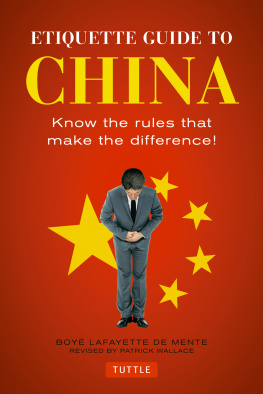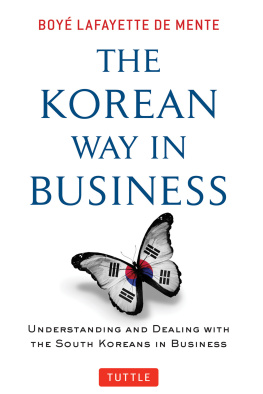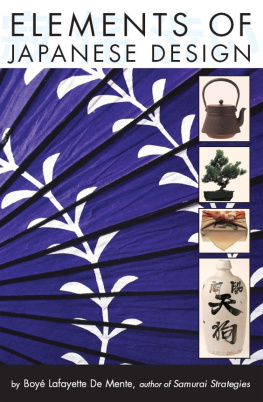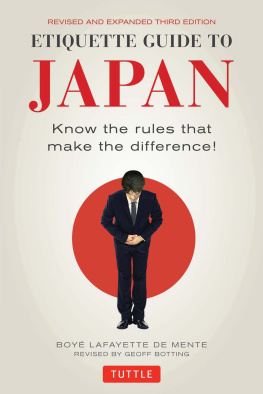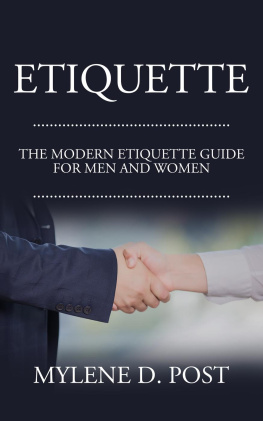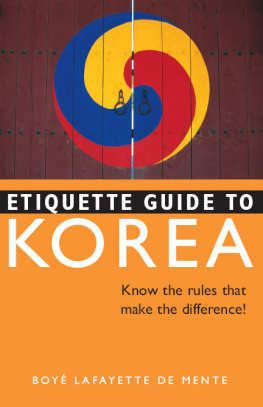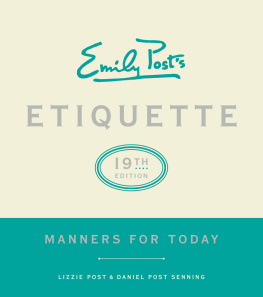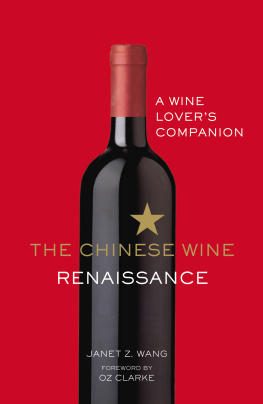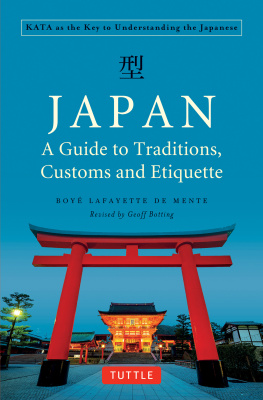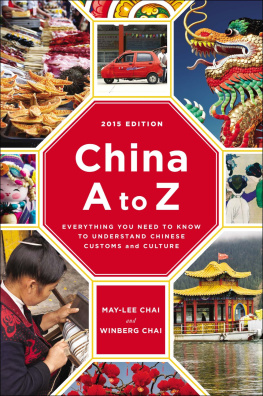Appendix
Selected Vocabulary & Useful Expressions
A lthough there are a number of languages and many regional dialects spoken in different parts of China, the national language is Mandarin. It is perfectly all right for you to use Mandarin wherever you are in China.
The Chinese appreciate it when foreign visitors speakor try to speakto them in their language, and are tolerant of faulty attempts because they are well aware that it is difficult for foreigners to quickly master the up-and-down tones of the language.
I have included English-language phonetics for the Chinese words and phrases used in this book. They do not account for the tones, but they are generally close enough that you will be understood. Here are personal titles, some common greetings, and useful expressions.
Personal Titles
Mr Xiansheng (she-inn-shuung)
Miss Xiaojie (she-ow-jay)
Ms Nushi (nu-she)
Madame or Mrs Furen (fuu-wren) or Taitai (tie-tie)
Master Shifu (shurr-fuu)This term of respect is used to address professional people whose names you do not know, including waiters, chefs, craftsmen, repairmen, and so on.
Family Relationships
Family Ji (jee-ah)
Family name Ji Xingming (jee-ah sheeng-meeng)
Given name Mingzi (meeng-dzu)
Father Fqin (fuuu-cheen)
Mother Mqin (muuu-cheen)
Husband Zhngfu (jahng-fuu)
Wife Qizi (chee-zu)
Wife, madame Taitai (tie-tie)
Children Hizi (hie-zu)
Age Ninling (nee-enn leeng)
Oldest child Laoda (lough-dah)
Second-born child Laoer (lough-urr)
Third-born child Laosan (louth-sahn)
Youngest child Laoyao (lough-yow)
Elder brother Xiong (she-ohng)
Youngest brother Xiaodi (she-ow-dee)
Corporate Titles
Chairman of the Board Dongshizhang (doong-she-jahng)
President Zongcai (johng-tsie)
Managing Director Zhong jingli (johng jeeng-lee)
Manager Jingli (jeeng-lee)
Head of a factory Changzhang (chahng-jahng)
Government Titles
Minister Buzhang (buu-jahng)
Bureau Director Juzhang (juu-jahng)
Division Director Chuzhang (chuu-jahng)
Governor Shengzhang (shuung-jahng)
Mayor Shizhang (she-jahng)
Everyday Expressions
Hello Ni hao (Nee how) Ni hao is also used as the equivalent of good morning, good afternoon, and good evening, but there are also specific terms for these expressions. It is also the form of greeting that is used by Chinese to foreigners, and is also recommended for foreigners to use to Chinese.
Hello (said to an older person) Nin hao (Neen-how)This is a more polite form of ni hao, commonly used when speaking to seniors.
You may hear the Chinese use a variety of greetings among themselves. Here are some of the most common:
Chiguo fan le ? (Chuh-gwaw fahn luh?)
Have you eaten?This traditional greeting is becoming less common, especially in the developed areas of China, as there is less concern about the next meal.
Mang ma ? (Mahng mah?)
Are you busy?This is now a common greeting among Chinese, particularly among friends. It is the equivalent of Whats up? and How are you doing?
Nin qu nar a ? (Neen chu nahhr ah?)
Where are you going?This is more or less the equivalent of What are you up to?
Other expressions that are used as greetings include references to things people are doing, such as You are reading, You are working, and so on.
Useful Sentences
Saying Hello and Good-bye
Good morning (until about 10 a.m.) Zaoshang hao (Zow-shahng how)
Good afternoon Xiawu hao (Shee-ah-woo how)
Good evening Wanshang hao (Wahn-shahng how)
Good night Wan an (Wahn ahn)
Hello, manager Jingli hao (Jeeng-lee how)It is common in China to greet people by their titles. Jingli (jeeng-lee) means manager, so jingli hao is the equivalent of hello, good morning, good afternoon, or good evening, manager; much as a Westerner might say, Good morning, boss.
Is it time to go? Jidian zou? (Jee-dee-in zoe?)
Good-bye Zai-jian (Zigh-jee-in)
Excuse me (May I trouble you?) Mafan ni (Mah-fahn nee)
Excuse me (to get attention) Lao jia (Lough jee-ah)
Getting to Know Each Other
What is your name? Ni jiao shenme mingzi?
(Nee jee-ow shuun-muh meeng-dzu?)
My name is_________
Wo jiao __________ (Waw jee-ow__________)
What is your family name?
Ni xing shenme? (Nee sheeng shuhn-muh)
My family name is____________
Wo xing _ ____________ (Waw sheeng___________)
This is Mr __________ Zhe wei shi ___________ xiansheng
(Dze way shuh __________ she-inn-shuung)
This is Mrs ___________ Zhe wei shi ___________ tu ren
(Dzu way shuh __________ too wren)
This is Miss ___________ Zhe wei shi ___________ xiajia
(Dzu way shuh __________ she-ah-jah)
Im pleased to meet you
Hen gaoxing renshi ni (Hin gow-sheeng wren-shuh nee)
OR Jiuyang (jew-yahng)
I am an American
Wo shi Meiguo ren (Waw shuh May-gwoh wren)
I am a Canadian
Wo shi Jianada ren (Waw shuh Jee-ah-nah-dah wren)
I am British Wo shi Yingguo ren (Waw shuh Eeen-gwoh wren)
I am Australian Wo shi Aodaliya ren
(Waw shuh Ah-oh-dah-lee-yah wren)
I am on a holiday Wo lai dujia (Waw lie duu-jah)
I am here on business
Wo lai zuo shengyi (Waw lie dzwoh shuung-ee)
In Conversation
Thank you Xie xie (Shay shay)
Very good Hen hao (Hin how)
Thats no good Bu hao (Boo how)
Thats right Duile (Dwee-luh)
Thats all right Mei guanxi (May gwahn-she)
All right/okay Hao/hao ba (How/how bah)
Please come in Qing jin (Cheeng-jeen)
Please sit down Qing zu (Cheeng dzwoh)
Welcome Hunying (Hwahn-eeng)
You are welcome B xi (Boo shay)
Dont mention it B kqi (Boo kuh-chee)
Excuse me/sorry Dui bqi (Dwee boo-chee)
Im sorry/I apologize Duibuqi (Dwee-boo-chee)
I am very sorry: Hen baoqian (Hin bow-chee-in)
Please hurry!: Qing gankuai! (Cheeng gahn-kwie!)
I know: Wo zhidao (Waw jr-dow)
I dont know: Wo bu zhidao (Waw buu jr-dow)
I understand: Wo dong (Waw doong)
I dont understand: Wo bu dong (Wa boo doong)
Do you understand? Dong ma? (Doong mah?)
Do you speak English?
Ni hui Yingwen ma? (Nee hwee Eeng-wun mah?)
Please repeat that Qing ni zaishuo yibian
(Cheeng nee zigh-shwaw ee-bee-in)
What did you say?
Ni shou shenma? (Nee shwaw shen-mah?)
I need an interpreter
Wo xuyao fanyi (Waw shu-yow fahn-ee)
Please write it down
Qing xie xia lai (Cheeng she-eh she-ah lie)
Please write it in Roman letters
Qing yong Pinyin xie (Cheeng young Peen-een she-eh)
Please write it in Chinese Qing yong Zhongwen xie
(Cheeng young Joong-wun she-eh)
Can you go with me? Ni neng he wo yiqi qu ma?
(Nee nuung huh waw ee-chee chuu mah?)
Where is the toilet?
Cesuo zai nali? (Tsuh-swaw jzigh nah-lee?)
Its hot! Man re du! (Mahn ruh duu!)
Its cold! Man leng de! (Mahn luung duh!)
Its raining Xia yu le (She-ah yuu luh)
Its windy Feng da (Fuung dah)
At the Restaurant
What time is dinner?
Wancan shi jidian? (Wahn-tsahn shr jee-dee-in?)
Im hungry Woe ele (Waw uh-luh)
Lets go eat Rang wo women qu chifan
(Rahng waw waw-mun chu chuh-fahn)
Where shall we eat?
Women qu nali chi? (Waw-mun chuu nah-lee chuh?)
I have a reservation Wo yuding le fangjian
(Waw yuu-deeng luh fahng-jee-in)
I like Chinese food
Zhong can xihuan (Joong tsahn she-hwahn)

